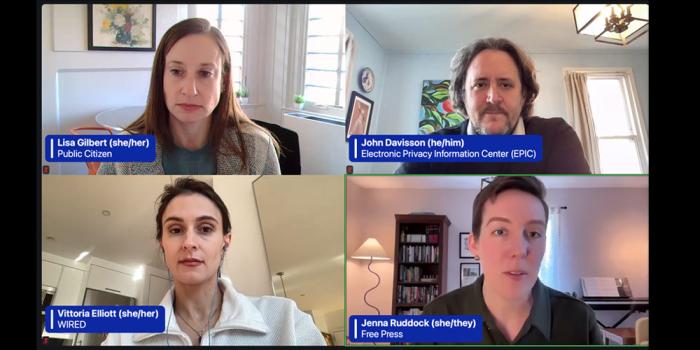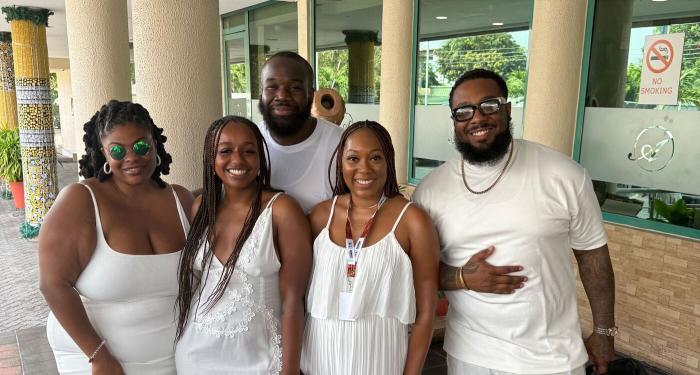How Free Press Is Working to Foster Equitable Journalism

Winning the just and equitable local news and civic information that communities need to thrive requires building strong relationships, shifting resources and addressing media narratives and practices that perpetuate harm. Here are some of the activities the News Voices, journalism-policy and Media 2070 teams at Free Press have been engaged in this summer:
The Free Press team hits the road

This summer, Free Press staff gathered at journalism convenings to learn new things about the field, reconnect with friends and allies, and network with brilliant folks working to make journalism more equitable. In July, News Voices Director Vanessa Maria Graber, Senior Advisor Joseph Torres and Journalism Program Manager Alex Frandsen participated in the Reimagining Journalism Convening at Northwestern Medill’s Washington office. Vanessa Maria also presented a session at the AEJMC conference on “How to Make Journalism Education More Inclusive and Less Extractive.”
In August, News Voices Program Manager Alisha Wang Saville attended the Engaging Emergence Pre-Conference in Philadelphia at Temple University, and News Voices: Philadelphia Program Manager Cassie Owens attended the Online News Association (ONA) Conference. Finally, members of the Journalism Accountability Watchdog Network (JAWN), which Free Press is part of, facilitated a focus group with journalists of color at ONA. We love being in the field, connecting with people and seeing the many examples of how we can make a brighter future for journalism.
Media advocates build community in Philly

On Aug. 25, more than 50 journalists, community-engagement experts, academics and organizers joined together in Philadelphia for an in-person happy hour that JAWN and Free Press’ Media Power Collaborative co-hosted. It was a rousing success: Attendees built community and learned more about the growing nationwide movement to create an equitable media system that better serves our communities.
Free Press’ Mike Rispoli and Vanessa Maria Graber talked to the crowd about what JAWN and the MPC have accomplished so far, and emphasized the need to forge community as a first step in building power. Represented organizations at the happy hour included AAJA Philly, Canopy Atlanta, City Bureau, the Institute for Nonprofit News, NAHJ Philly, Outlier Media, PABJ and Resolve Philadelphia.
A $500-million investment in local news
More than 2,000 local newspapers have closed in the United States over the last two decades. Earlier this year, Free Press’ Mike Rispoli, Elizabeth Green of Civic News Company and City Bureau alum Darryl Holliday published The Roadmap for Local News: An Emergent Approach to Meeting Civic Information Needs, a plan to ensure that every community has the news and information it needs.
The MacArthur Foundation recently announced the launch of Press Forward, an initiative to invest $500 million in local journalism, including support for civic media and public-policy development. This new fund’s grant-priority areas align with the Roadmap’s recommendations.
Event highlights need for nuanced reporting on climate issues and environmental justice
In July, Free Press, the Center for Cooperative Media and the League of New Jersey Conservation Voters co-hosted the virtual event “Framing the Media Narrative on Environmental Justice and the Climate Crisis,” which featured environmental-justice policy advocates and journalists who cover climate issues.
Thanks to our partners, the panelists and all the participants who took part in this insightful conversation! Check out the video and let us know what you think.
Rethinking journalism education

Diamond Hardiman, Free Press’ reparative journalism program manager, participated in the panel discussion “Rethinking Journalism Education from the Ground Up.” She shared her reparative-journalism research and offered insights into what journalism education could look like if it incorporated restorative-justice principles. Gather, which supports community-minded journalists, hosted the conversation. (Sign in to watch the replay.)
Media 2070 launches a college course on media harms & reparations

When the Black caucus at Free Press launched Media 2070 in 2020, the team knew it wanted to weave education into its mission of securing media reparations for harms inflicted on Black people. As part of this goal, Media 2070 Campaign Manager Venneikia Williams taught a month-long course at Colorado College in May called “Diagnosing the Media System.”
The class examined the deep history of media harm in our country, how media as a system was intentionally designed to “hoard power, extract labor and primarily benefit the political and material interests of certain people (mainly, white men),” and the power of apologies as one step toward media reparations. Read Venneikia’s takeaways from the course and learn what’s next for this media-reparations curriculum.
Reads & resources
- Venneikia Williams co-authored a piece with Aria Florant of Liberation Ventures that appears in the new book Building a Pro-Black World: Moving Beyond DE&I Work and Creating Spaces for Black People to Thrive by Cyndi Suarez of Nonprofit Quarterly. The essay, “Reimagining Philanthropy to Build a Culture of Repair,” calls on the philanthropic sector to “reckon with systems that created concentrated wealth in the first place” and explores ways to interrupt the unequal power dynamics between grantor and grantee.
- Diamond Hardiman and Collette Watson joined veteran journalist Richard Prince for a roundtable discussion considering whether the media have improved their coverage of crime since maligning the Central Park Five — now known as the Exonerated Five. One of the participants was the attorney for Korey Wise, one of the unjustly incarcerated teenagers. Watch the conversation here.
- Diamond and Collette also published the piece “It’s time to explore how the media plays a role in race-based violence” in The Buffalo News.
- Check out the newly updated and expanded version of the Trans Journalist Association’s Style Guide.
- New research from the University of Vermont’s Center for Community News shows that students play a growing role in producing local journalism across the country.
We believe the future of local journalism and the future of democracy are intertwined. With an average of two local newspapers shutting down every week — and with the current media system harming or failing to meet the needs of many communities — this is a critical moment to build bridges between journalism and civic life.
The News Voices team looks forward to continuing to work with allies to address media harms, build power with communities and advocate for journalism repair and transformation. Get in touch if you’d like to be part of that future.




